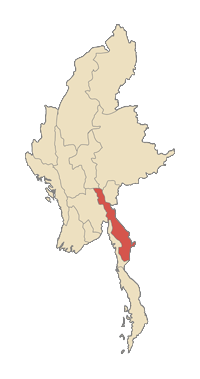This article needs additional citations for verification. (June 2016) |
The S'gaw, (S'gaw Karen: စှီၤ or ပှၤကညီဖိ, also spelled Skaw, S'gau), who refer to themselves as Paganyaw, Pga K'nyau, or K'Nyaw [1] (also spelled Pgaz Cgauz and Pakayo,[2][better source needed]), are an ethnic group of Burma and Thailand.[3] They speak the S'gaw Karen language.[4]
Karen flag | |
 A S'gaw Karen woman in a traditional dress | |
| 2,600,000 | |
| Languages | |
|---|---|
| S'gaw Karen | |
| Religion | |

The S'gaw are a subgroup of the Karen people. They are also referred to by the exonym White Karen,[5] a term dating from colonial times and used in contrast to the Karenni (or "Red Karen") and the Pa'O (or "Black Karen"), even though the latter often rejected the term "Karen" to refer to themselves.[5]
The S'gaw live primarily in eastern Burma (Karen State, Mon state, Karenni state). Many of them migrate to Thai-Burmese border and live there as a refugees for many decades due to conflict in Karen state. S'gaw people are the founder of the Karen National Union (KNU).
Origins
editKaren (S'gaw and Pwo) legend refer to a 'river of running sand' (S'gaw Karen: ထံဆဲမဲးယွါ) which they believe Pu Taw Meh Pa led the Karen people across the river of the running sand. Many Karen think this refers to the Gobi Desert, although they have lived in Burma for centuries. The legend made the Karen people believe that they are from Mongolia.
See also
editReferences
edit- ^ Keyes, Charles (September 2011). The Study of Ethnicity in the Greater Mekong Subregion (PDF). Faculty of Liberal Arts, Ubon Ratchathani University. p. 18.
- ^ Land Use and Sustainability in the Highlands of Northern Thailand Archived 2011-09-29 at the Wayback Machine
- ^ Hilltribes in Thailand
- ^ Ethnologue - Karen, S’gaw
- ^ a b Sir George Scott. Among the Hill Tribes of Burma – An Ethnological Thicket. National Geographic Magazine, 1922, p. 293
- ^ "The Heavens - World Treasures: Beginnings - Exhibitions - Library of Congress". loc.gov. 29 July 2010.